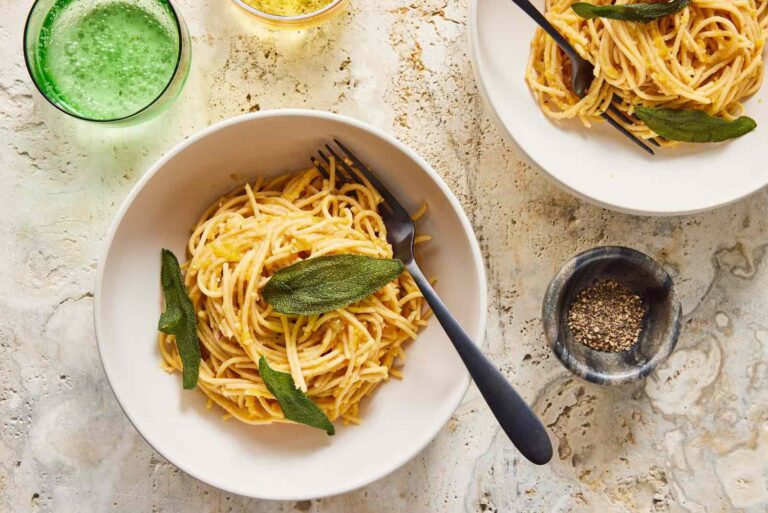Nutritional Notes
Is butternut squash nutritious?
Butternut squash is one of many varieties of winter squash and is packed with nutrients. In just 1 cup of butternut squash, you’ll get 400% of your daily value of vitamin A and 3 grams of fiber. It is also rich in vitamin C and is a good source of B vitamins, potassium and magnesium. Butternut squash is also rich in zeaxanthin, an antioxidant that research shows may help protect the eyes, heart, and immune system.
Is this recipe vegetarian?
Yes, as long as you use parmesan which does not contain rennet, an animal-derived enzyme that helps milk coagulate naturally during the cheese-making process. Look for parmesan that specifically says it’s vegetarian, like Organic Valley Parmesan cheese.
What are the benefits of whole wheat spaghetti? Can I use another type?
Whole wheat is a whole grain, and whole grains have many health benefits. They’re packed with soluble fiber, vitamins, minerals, and heart-healthy antioxidants that have been shown to reduce inflammation. If you prefer, you can use regular spaghetti or other long noodles made from refined white flour, although this will change the nutritional value of the recipe. If the taste of whole wheat spaghetti is the problem, try using half whole wheat and half regular noodles in this recipe.
Tips from the test kitchen
Can I use dried thyme instead of fresh thyme?
If you don’t have fresh thyme on hand, you can use 1/4 teaspoon to 1/2 teaspoon dried thyme instead.
What is white miso? Is there a substitute?
Miso is a tasty fermented soy paste. It is made from boiled or steamed soybeans, fermented with koji, salt and yeast. There are many varieties of miso, usually divided into categories by color. White miso is fermented for a relatively short period of time. It has a smooth texture and a mild, sweet flavor that works well here. If you can’t find white miso, you can use other varieties of miso paste, such as awase (mixed) or red. Other varieties of miso are saltier and hotter, so you’ll only need to use about 1/2 teaspoon to 1 teaspoon.
Why should I reserve pasta water?
When pasta is cooked, the starch is released into the water. We reserve some of this starchy pasta water and slowly add it to the cooked pasta and butternut squash mixture until the sauce has a creamy consistency. The starch in the pasta water acts as a thickener, which helps the sauce stick to the pasta.
Frequently asked questions
What can I pair with butternut squash pasta?
Serve the butternut squash pasta with a simple side salad for an easy dinner. It’s also delicious accompanied by a Arugula and Fennel Salad with Lemon Vinaigrettea hearty Cranberry Kale Salad or a crisp Red Cabbage Salad with Blue Cheese and Maple-Glazed Walnuts.
Additional reports by Carrie Myers And Jan Valdez
